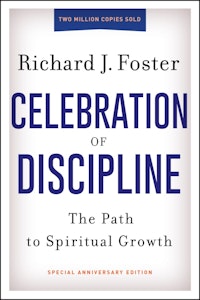 Excerpt from Celebration of Discipline
Excerpt from Celebration of Discipline
It is sobering to realize that the very first statement Jesus made about fasting dealt with the question of motive (Matt. 6:16 – 18). To use good things to our own ends is always the sign of false religion. How easy it is to take something like fasting and try to use it to get God to do what we want. At times there is such stress upon the blessings and benefits of fasting that we would be tempted to believe that with a little fast we could have the world, including God, eating out of our hand.
Fasting must forever center on God. It must be God-initiated and God-ordained. Like the prophetess Anna, we need to be “worshiping with fasting” (Luke 2:37). Every other purpose must be subservient to God; like that apostolic band at Antioch, “fasting” and “worshiping the Lord” must be said in the same breath (Acts 13:2). C. H. Spurgeon wrote, “Our seasons of fasting and prayer at the tabernacle have been high days indeed; never has heaven’s gate stood wider; never have our hearts been nearer the central glory.”
God questioned the people in Zechariah’s day, “When ye fasted… did ye at all fast unto me, even to me?” (Zech. 7:5). If our fasting is not unto God, we have failed. Physical benefits, success in prayer, the ending with power, spiritual insights — these must never replace God as the center of our fasting. John Wesley declared, “First, let [fasting] be done unto the Lord with our eye singly fixed on him. Let our intention herein be this, and this alone, to glorify our Father which is in heaven.” That is the only way we will be saved from loving the blessing more than the blesser.
Once the primary purpose is firmly fixed in our hearts, we are at liberty to understand that there are also secondary purposes in fasting. More than any other single discipline, fasting reveals the things that control us. This is a wonderful benefit to the true disciple who longs to be transformed into the image of Jesus Christ. We cover up what is inside us with food and other good things, but in fasting, these things surface. If pride Controls us, it will be revealed almost immediately. David said, “I humbled my soul with fasting” (Ps. 69:10). Anger, bitterness, jealousy, strife, fear — if they are within us, they will surface during fasting. At first we will rationalize that our anger is due to our hunger; then we know that we are angry because the spirit of anger is within us. We can rejoice in this knowledge because we know that healing is available through the power of Christ.
Fasting helps us keep our balance in life. How easily we begin to allow nonessentials to take precedence in our lives. How quickly we crave things we do not need — until we are enslaved by them. Paul wrote, “‘All things are lawful for me,’ but I will not be enslaved by anything” (1 Cor. 6:12). Our human cravings and desires are like a river that tends to overflow its banks; fasting helps keep them in their proper channel. “I pummel my body and subdue it,” said Paul (1 Cor. 9:27). Likewise, David wrote, “I afflicted myself with fasting” (Ps. 35:13). That is discipline and discipline brings freedom.
Although the physical aspects of fasting intrigue us, we must never forget that the major work of scriptural fasting is in the realm of the spirit. What goes on spiritually is much more important than what is happening bodily. Fasting can bring breakthroughs in the spiritual realm that will never happen in any other way. It is a means of God’s grace and blessing that should not be neglected any longer.
Excerpted from Celebration of Discipline (HarperOne, 1998 — 3rd Ed.)
Photo by Kamil Szumotalski on Unsplash
Text First Published December 1977 · Last Featured on Renovare.org March 2022


